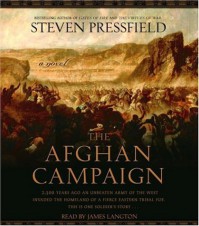4
Followers
9
Following
Clif's Book World
Adventures from reading books captured within short reviews.
The Afghan Campaign: A novel
 This historical novel is about Alexander the Great's invasion of Afghanistan in 330 B.C. It's the one place where Alexander's army met with less than total success. More than once they invaded an area only to learn that their enemy had mysteriously appeared in their rear. This was frustrating to an army that knew they were the best in the world and were used to conquering any force that confronted them. This book is an amplification of one of the chapters of the book, The Virtues of War: A Novel of Alexander the Great by the same author. The narrative of this book is told in first person from the point of view of a corporal in Alexander's cavalry (he's a foot soldier part of the time).
This historical novel is about Alexander the Great's invasion of Afghanistan in 330 B.C. It's the one place where Alexander's army met with less than total success. More than once they invaded an area only to learn that their enemy had mysteriously appeared in their rear. This was frustrating to an army that knew they were the best in the world and were used to conquering any force that confronted them. This book is an amplification of one of the chapters of the book, The Virtues of War: A Novel of Alexander the Great by the same author. The narrative of this book is told in first person from the point of view of a corporal in Alexander's cavalry (he's a foot soldier part of the time). It's interesting to try to find parallels with more recent occupations of Iraq and Afghanistan by a foreign power. See if you and detect some similarities.
1. Alexander's forces were a western undefeated super power that was relatively high tech for their time. (Think shock and awe.)
2. Alexander's campaign arrogantly invaded the country, ignorant of its culture. (Think Bush-Cheney-Rumsfeld's world view.)
3. Alexander prematurely declared victory. (Think "Mission Accomplished" on the aircraft carrier.)
4. Soon after the invasion, an insurgency popped up. (Think Iraq for the past seven years and Taliban more recently.)
5. Spitamenes, the leader of the resistance, was an educated son of a wealthy Persian, not a native to the country. (Think Osama bin Laden.)
6. Alexander responded with conventional military force. (Think Marines sacking Fallujah.)
7. Alexander tried sealing the borders. (Think Syrian or Pakistan borders.)
8. Alexander then called in additional reinforcements. (Think surge in deployments.)
9. In desperation Alexander began hiring the militias and the tribes who had been fighting him. (Think Anbar awakening.)
10. Part of Alexander's exit strategy was to marry a tribal chief's daughter. (Not sure that option will work today.)
11. One tactic used by Alexander's forces was to kill off the native population, women and children included. (I hope we're civilized enough to not try that tactic in today's global environment.)
12. The unconventional nature of the war hurt the morale of Alexander's forces. (Could the Abu Ghraib prison be a parallel here?)
13. In the negotiations to end the conflict it was important to reach an agreement in which both sides could claim victory. (Suggestions of negotiating with the Taliban?)
(Note to strict historians: I know a few things were stretched and conflated to make the above parallels.) It should be noted here that it was common for Alexander to incorporate former foes into his army. This particular book tells of action taken to repress the spread of the knowledge of certain atrocities in order to allow the hiring of former enemy tribesmen who had committed the atrocities. I don't know if the author had a historical basis for including that incident. Nevertheless, it created another modern parallel; propaganda and control of news coverage.
The following quote from the book explains in Alexander's words why it is time to cut and run (i.e. declare victory and leave):
"This is what war is," says Alexander. "Glory has fled. One searches in vain for honor. We've all done things we're ashamed of. Even Victory, as Aeschylus says, "in whose august glow all felonies are effaced," is not the same in this war. What remains? To prevent the needless waste of lives. Too many good men have perished without cause. More will join them if we don't make this peace now."
Other powers have invaded Afghanistan since the time of Alexander, and they all have had their problems. Over the past couple hundred years that included the British (two times) and the Soviets. If Alexander were still with us he'd probably say that it's the same o' same o'.
There's a love story of sorts woven into the plot as well. It turns into a parable of war. Romantics will be disappointed. The book ends with these words:
"Though blind, God sees; though deaf, He hears. ...
...Afghanistan's deity gives up nothing. One appeals to him in vain. Yet he sustains those who call themselves his children, who wring a living from this stony and sterile land."
I have come to fear this god of the Afghans. And that has made me a fighting man, as they are."


